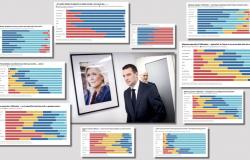Historic results for a party in the European elections and a reaction from the President of the Republic which is even more so. June 9, 2024 will undoubtedly remain in the political history books of France. After the score of the National Rally (31.4% of votes cast) and Emmanuel Macron’s decision to dissolve the National Assembly, a particularly uncertain political sequence begins.
What are the lessons from the European elections? And what do they tell us about the legislative elections which are looming in three weeks? Interview with Vincent Tiberj, researcher at the University of Bordeaux specializing in electoral sociology and co-author of the work Citizens and parties after 2022. Distance, fragmentation, which has just been published in May by Presses Universitaires de France.
The National Rally (RN) obtained excellent electoral scores last night. What lessons do you learn from this victory?
Vincent Tiberj : The main victory of the RN did not date from last night. It dates back several months… but it is not definitive! Let’s go back a little: since the pension reform, which made it possible to talk about work, social protection and inequalities, Marine Le Pen’s party has succeeded in imposing the framing of the political and media debate around its subjects. predilection, and in particular immigration and insecurity.
If we take a sporting metaphor, the RN has been “playing at home” for months. He dictates the tempo on his favorite subjects. And many parties are trying to imitate it, hoping to counter it. The result is clear: it doesn’t work, moreover, it reinforces it. However, we cannot say that there has been an RN tidal wave in France nor that Jordan Bardella or Marine Le Pen are sure to settle in Matignon at the start of the summer.
31.4% in the European elections is still unheard of for forty years…
VT: Yes, but the main choice in France remains… abstention! 48.5% of voters did not vote yesterday. Certainly, it is less than in previous European elections [49,88 % en 2019 et 57,57 % en 2014, NLDR], but if we take into account voters who do not go to the polls, the picture changes. For example, we have heard a lot since last night that the RN vote is now inter-class because the party has convinced one in five executives. Okay, it is no longer just the party of the underprivileged classes. But this June 9, the participation rate of executives was low [48 %, NDLR]. In total, therefore, “only” 9.6% of executives voted RN. Likewise, if 54% of workers who voted on Sunday slipped a Bardella ballot into the ballot box, this represents “only” 24% of voters in this profession in total. The first “party” of workers remains by far abstention.
The RN is often presented as the anti-system party, but it is part of an electoral system that is still largely shunned
The RN is often presented as the anti-system party, but given the level of abstention, it is part of an electoral system that is still largely shunned. He did not manage to stem abstention by bringing back to the polls a number of voters who no longer came to vote. Likewise, despite the much publicized “success” of Jordan Bardella on social networks among young people, the RN does not obtain very good scores among them if we take into account abstention. It therefore does not bring a new dynamic among new or former voters. Its breakthrough among the upper middle classes and seniors comes mainly from its ability to convince former right-wing voters. And of course to keep your own.
Obviously, this reasoning also applies to other parties, and in particular the left. Yesterday, the four main left-wing parties (LFI, PS, EELV, PCF) together obtained 22% of the votes of workers who voted, or barely 10% of voting workers. These scores are worrying, but they also implicitly say that it is not inevitable because 56% of workers did not vote yesterday.
Can the left really win them back?
VT: Several quality opinion studies show that the values that the left is supposed to embody are much better established in France than we think. But the parties which, on paper, support them are very discredited among left-wing citizens. The latter no longer have anything to do with the Communist Party activists of the 1970s who followed the party’s instructions to the letter. These “distant citizens” are not depoliticized: they are more demanding and prefer to get involved in associations, local collectives, etc.
Parties which, on paper, carry left-wing values are very discredited among left-wing citizens
These citizens are now highly qualified and they have a memory. Many consider that the government left, and in particular François Hollande, have betrayed them. Many of them also kept very bad memories of the “Republican barrage” to which they took part against their will, keeping in mind Emmanuel Macron who is pushing through a pension reform by putting forward the argument “that it was elected for that” while his election owes a lot to a default vote of left-wing citizens. Putting the Republic on the heads of these people no longer works.
Yet this is probably Emmanuel Macron’s bet in triggering new legislative elections?
VT: Emmanuel Macron is counting on a remobilization of his electorate. Unquestionably, its very low score (14.6% of votes cast) can be explained by a demobilization of its 2022 voters. And even for those who returned to the polls, a significant number voted for the PS, LR and, to a lesser extent, the RN. In electoral sociology, we distinguish between “first order” elections, with significant power stakes, and “second order” elections, in which the power stakes are low and for which voters are used to sending ballots. political messages without necessarily wanting to entrust power to the party for which they vote.
Analyzing the RN vote as a simple protest vote is very questionable: the party is no longer there to act as a foil
The European elections were, at least until yesterday, a second-rate election. Emmanuel Macron therefore surely thinks that his voters will return to “serious” parties when it really counts, at the end of June. But analyzing the RN vote as a simple protest vote is very questionable: the party has become structured, professionalized, and is no longer there to act as a foil.
Participation will be the key for the Macronists and the left, because they have the most to gain from a revival. Will she be there? Specialists observe two effects in this area. A “fire alert” effect, whereby voters go to the polls when it really matters, and a “flurry” effect, whereby people move when the election campaign has been intense, invading the media and interfering in the family and friendly discussions. With a campaign lasting only three weeks, the second effect is very unlikely. It remains to be seen to what extent the former will play.
One thing is certain, in the context of a two-round single-member vote, the left only has a chance of doing well by being united, even with a clear increase in participation from its troops.






